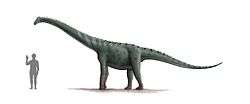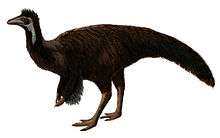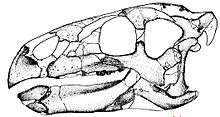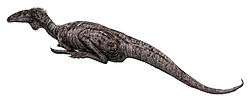2003 in paleontology
| |||
|---|---|---|---|
| Wikimedia Commons has media related to 2003 in paleontology. |
Paleontology or palaeontology (from Greek: paleo, "ancient"; ontos, "being"; and logos, "knowledge") is the study of prehistoric life forms on Earth through the examination of plant and animal fossils.[1] This includes the study of body fossils, tracks (ichnites), burrows, cast-off parts, fossilised feces (coprolites), palynomorphs and chemical residues. Because humans have encountered fossils for millennia, paleontology has a long history both before and after becoming formalized as a science. This article records significant discoveries and events related to paleontology that occurred or were published in the year 2003.
Paleozoology
Arthropods
New taxa
| Name | Novelty | Status | Authors | Age | Unit | Location | Notes | Images |
|---|---|---|---|---|---|---|---|---|
|
Subfam. nov |
Valid |
Bolton |
A stem group ant, type species B. clavata |
| ||||
|
Sp. nov |
valid |
Engel & Archibald |
Coldwater beds, Princeton Group |
first apoid bee described from Canada |
||||
|
sp nov |
Valid |
|||||||
|
Sp. nov |
valid |
Engel & Archibald |
Coldwater beds, Princeton Group |
A Hemerobiinae lacewing |
Conodont paleozoology
German paleontologist and stratigrapher Heinz Walter Kozur (1942-2013) described the conodont genus Carnepigondolella.
Parareptiles
| Name | Status | Authors | Location | Notes | Images |
|---|---|---|---|---|---|
| Bunostegos | Valid taxon | This was one of the largest herbivores of their time |
Non-avian dinosaurs
Newly named non-avian dinosaurs
Data courtesy of George Olshevsky's dinosaur genera list.[6]
| Name | Status | Authors | Location | Notes | Images |
|---|---|---|---|---|---|
| "Abdallahsaurus"[7] |
|
Nomen nudum; possibly a junior synonym of Giraffatitan or Brachiosaurus |
|||
| "Blancocerosaurus"[8] |
|
Nomen nudum; possibly a junior synonym of Giraffatitan or Brachiosaurus | |||
| Amazonsaurus[9] | Valid taxon |
|
 | ||
| Antetonitrus[10] | Valid taxon |
|
|||
| Aviatyrannis[11] | Valid taxon |
|
 | ||
| Bainoceratops[12] | Valid taxon |
|
|||
| Brohisaurus | Valid taxon |
|
|||
| Colepiocephale[13] | Valid taxon |
|
|||
| "Domeykosaurus" | Nomen nudum |
Rubilar-Rogers and Vargas vide:
|
|||
| Dromaeosauroides[14] | Valid taxon |
|
|||
| Equijubus[15] | Valid taxon |
|
|||
| Ferganasaurus[16] | Valid taxon |
|
|||
| Fukuisaurus[17] | Valid taxon |
|
|||
| Gobititan[18] | Valid taxon |
|
|||
| Hanssuesia[19] | Valid taxon |
|
|||
| Heyuannia[20] | Valid taxon |
|
| ||
| Hongshanosaurus[21] | Valid taxon |
|
| ||
| Isisaurus[22] | Valid taxon |
|
| ||
| "Issasaurus"[7] |
|
Nomen nudum; possibly a junior synonym of Dicraeosaurus |
|||
| Lamaceratops[23] | Valid taxon |
|
|||
| "Ligomasaurus"[7] |
|
Nomen nudum; possibly a junior synonym of Giraffatitan or Brachiosaurus |
|||
| Lusotitan[24] | Valid taxon |
|
|||
| Magnirostris[25] | Valid taxon |
|
|||
| Mendozasaurus[26] | Valid taxon |
|
|||
| "Mohammadisaurus"[7] |
|
Nomen nudum; possibly a junior synonym of Tornieria | |||
| "Mtapaiasaurus"[7] |
|
Nomen nudum; possibly a junior synonym of Giraffatitan or Brachiosaurus |
|||
| "Mtotosaurus"[7] |
|
Nomen nudum; possibly a junior synonym of Dicraeosaurus |
|||
| "Nteregosaurus"[7] |
|
Nomen nudum; possibly a junior synonym of Janenschia |
|||
| "Nyororosaurus"[7] |
|
Nomen nudum; possibly a junior synonym of Dicraeosaurus |
|||
| Olorotitan[27] | Valid taxon |
|
| ||
| Platyceratops[23] | Valid taxon |
|
|||
| Rajasaurus[28] | Valid taxon |
|
| ||
| Rinconsaurus[29] | Valid taxon |
|
| ||
| "Salimosaurus"[7] |
|
Nomen nudum; possibly a junior synonym of Giraffatitan or Brachiosaurus |
|||
| "Selimanosaurus"[7] |
|
Nomen nudum; possibly a junior synonym of Dicraeosaurus |
|||
| Serendipaceratops[30] | Valid taxon |
|
|||
| Shenzhousaurus[31] | Valid taxon |
|
|||
| Shuangmiaosaurus[32] | Valid taxon |
|
|||
| Silesaurus[33] | Valid taxon |
|
|||
| Sinornithomimus[34] | Valid taxon |
|
|||
| Sphaerotholus[35] | Possible junior synonym of Prenocephale |
|
|||
| "Wangonisaurus"[7] |
|
Nomen nudum; possibly a junior synonym of Giraffatitan or Brachiosaurus |
|||
| Yixianosaurus[36] | Valid taxon |
|
|||
| Zalmoxes[37] | Valid taxon |
|
| ||
| Zupaysaurus[38] | Valid taxon |
Arcucci & Coria |
| ||
Newly named birds
| Name | Status | Novelty | Authors | Age | Unit | Location | Notes | Images |
|---|---|---|---|---|---|---|---|---|
|
Amanuensis pickfordi [39] |
Gen. et sp. nov |
valid |
Cécile Mourer-Chauviré |
Middle Miocene |
A Sagittariidae, relative of the secretarybird. The type species of Amanuensis Mourer-Chauviré, 2003. |
|||
|
Valid |
Gen. nov. et Sp. nov. |
Bonnie E. Gulas-Wroblewski Anton F.-J. Wroblewski |
Middle Eocene |
|
The type species of Amitabha Gulas-Wroblewski & Wroblewski, 2003. Placed in crown Galliformes, but only compared with Phasianidae, not with other Eocene birds from North America. |
|||
|
Anhinga minuta [41] |
Valid |
Sp. nov. |
Herculano M. F. de Alvarenga Edson Guilherme |
Huayquerian-Montehermosian, Solimõas Formation |
An Anhingidae. |
|||
|
Coenocorypha miratropica [42] |
Valid |
Sp. nov. |
Vitilevu |
A Scolopacidae. |
||||
|
Diomedea tanakai [43] |
Valid |
Sp. nov. |
Paul G. Davis |
Late Early Miocene |
An Diomedeidae. |
|||
|
Eoeurypyga olsoni [44] |
Nomen Nudum |
Thesis name. |
Ilka Weidig |
Early Eocene |
|
An Eurypygidae. |
||
|
Falco umanskajae [45] |
Valid |
Sp. nov. |
Denis V. Sobolev |
A Falconidae. |
||||
|
Valid |
Sp. nov. |
Graham M. Wragg |
Late Pleistocene-Holocene |
A Columbidae. |
||||
|
Valid |
Sp. nov. |
Subresent |
|
|||||
|
Macranhinga ranzii [41] |
Valid |
Sp. nov. |
Herculano M. F. de Alvarenga Edson Guilherme |
Huayquerian-Montehermosian |
An Anhingidae. |
|||
|
Milvago carbo [48] |
Valid |
Sp. nov. |
William Suárez Duque |
Quaternary, possibly Late Pleistocene or Early Holocene |
Las Breas de San Felipe |
A Falconidae. |
||
|
Morus peruvianus [49] |
Valid |
Sp. nov. |
Marcelo Stucchi |
A Sulidae. |
||||
|
Gen. et sp. nov |
valid |
Cécile Mourer-Chauviré |
Middle Miocene |
Initially thought to be an Idiornithidae, Cariamiformes but in 2011 reinterpreted as an Opisthocomidae, a relative of the hoatzin.[50] The type species of Namibiavis Mourer-Chauviré, 2003. |
||||
|
Valid |
Sp. nov. |
W. R. P. Bourne N. P. Ashmole K. E. L. Simmons |
Subrecent |
An Ardeidae. |
||||
|
Palaeogrus mainburgensis [52] |
Valid |
Sp. nov. |
Ursula B. Göhlich |
Early Middle Miocene |
A Gruidae. |
|||
|
Parargornis messelensis [53] |
Valid |
Gen. nov et Sp. nov. |
Early Middle Eocene |
An Apodiformes, Cypselavidae Mourer-Chauviré, 2006. |
||||
|
Shandongornis yinansis [54] |
Valid |
Gen. nov et Sp. nov. |
Hou Lianhai |
A Phasianidae. |
||||
|
Spheniscus chilensis [55] |
Valid |
Sp. nov. |
Steven D. Emslie Carlos Guerra Correa |
Mejillones Formation |
A Spheniscidae. |
|||
|
Spheniscus megaramphus [56] |
Valid |
Sp. nov. |
Marcello Stucchi Mario Urbina Alfredo Giraldo |
Late Miocene |
A Spheniscidae. |
|||
|
Sula magna [49] |
Valid |
Sp. nov. |
Marcello Stucchi |
A Sulidae. |
||||
|
Sula sulita [49] |
Valid |
Sp. nov. |
Marcello Stucchi |
A Sulidae. |
||||
|
Wyomingcypselus pohli [44] |
Nomen Nudum |
Thesis name. |
Ilka Weidig |
Early Eocene |
|
An Apodiformes. |
||
Plesiosaurs
New taxa
|
|||||||||||||||||
Pterosaurs
New taxa
|
| ||||||||||||||||||||||||||||||||||||||||||||||||||||||||||
Synapsids
Non-mammalian
| Name | Status | Authors | Discovery year | Age | Unit | Location | Notes | Images |
|---|---|---|---|---|---|---|---|---|
|
Valid |
|
Upper Carboniferous |
||||||
|
Valid |
|
|||||||
|
Valid |
|
|||||||
|
Valid |
|
|||||||
|
Valid |
|
Upper/Middle Permian |
an anomodont | |||||
|
Valid |
|
Middle/Upper Permian |
an anomodont; replacement name for Lanthanocephalus Modesto, Rubidge & Welman, 2002, preoccupied by the cnidarian genus Lanthanocephalus Williams & Starmer, 2000[62] | |||||
|
Valid |
|
|||||||
|
Valid |
|
Middle Triassic |
an anomodont; new genus for "Parakannemeyeria" brevirostris | |||||
Mammals
| Name | Status | Authors | Discovery year | Age | Unit | Location | Notes | Images |
|---|---|---|---|---|---|---|---|---|
|
Caracal depereti[65] |
Disputed |
|
Pliocene |
A member of Felidae, originally described as a species of Caracal. Boscaini et al. (2016) considered this species to be a junior synonym of Lynx issiodorensis.[66] |
||||
|
Iridodon[67] |
Valid |
|
Eocene (Bridgerian) |
A member of Hyaenodontidae belonging to the subfamily Limnocyoninae. The type species is I. datzae. |
||||
|
Kogolepithecus[68] |
Valid |
|
Miocene |
An early catarrhine of uncertain affinity. The type species is K. morotoensis. |
||||
Fungi
newly named
| Name | Status | Authors | Age | Unit | Location | Notes | Images |
|---|---|---|---|---|---|---|---|
|
Valid |
|
Burdigalian (Miocene) |
|
||||
Plants
Conifers
| Name | Status | Authors | Age | Unit | Location | Notes | Images |
|---|---|---|---|---|---|---|---|
|
Valid |
|
C. eureka is the oldest confirmed member of the genus Chamaecyparis[70] |
|||||
Angiosperms
| Name | Status | Authors | Age | Unit | Location | Notes | Images |
|---|---|---|---|---|---|---|---|
|
Valid |
|
| |||||
|
Araripia florifera[72] |
Valid |
|
|||||
Gnetophytes
| Name | Status | Authors | Age | Unit | Location | Notes | Images |
|---|---|---|---|---|---|---|---|
|
Cratonia cotyledon[73] |
Valid |
|
|||||
References
- ↑ Gini-Newman, Garfield; Graham, Elizabeth (2001). Echoes from the past: world history to the 16th century. Toronto: McGraw-Hill Ryerson Ltd. ISBN 9780070887398. OCLC 46769716.
- ↑ Bolton, B. (2003), "Synopsis and classification of Formicidae.", Memoirs of the American Entomological Institute, 71: 1–370
- ↑ Engel, Michael S.; Archibald, S. Bruce (2003). "An Early Eocene bee (Hymenoptera: Halictidae) from Quilchena, British Columbia". The Canadian Entomologist. 135: 63–69. doi:10.4039/n02-030.
- ↑ Engel, M.S. (2003). "A New Eocene-Oligocene Snakefly from Florissant, Colorado (Raphidioptera: Raphidiidae)". Transactions of the Kansas Academy of Science. 106: 124–128. doi:10.1660/0022-8443(2003)106[0124:anesff]2.0.co;2. JSTOR 3628392.
- ↑ Makarkin, VN; Archibald, SB; Oswald, JD (2003). "New Early Eocene brown lacewings (Neuroptera: Hemerobiidae) from western North America". The Canadian Entomologist. 135: 637–653. doi:10.4039/n02-122.
- ↑ Olshevsky, George. "Dinogeorge's Dinosaur Genera List". Retrieved 2008-08-07.
- 1 2 3 4 5 6 7 8 9 10 11 Maier, G. 2003. African dinosaurs unearthed: the Tendaguru expeditions. Indiana University Press, Bloomington, IA (512 pages).
- ↑ Maier, G. 1997. Tendaguru. In: Encyclopedia of Dinosaurs (J.Currie and K.Padian, eds.). Academic Press, San Diego, California/London, UK: pp.725-726.
- ↑ de Souza Carvalho, I., L. dos Santos Avilla, and L. Salgado. 2003. Amazonsaurus maranhensis gen. et sp. nov. (Sauropoda, Diplodocoidea) from the Lower Cretaceous (Aptian–Albian) of Brazil. Cretaceous Research 24 (6): pp. 697-713.
- ↑ Yates, A.M. and J.W. Kitching. 2003. The earliest known sauropod dinosaur and the first steps towards sauropod locomotion. Proceedings: Biological Sciences DOI 10.1098/rspb. 2003: p. 2417 (Antetonitrus ingenipes).
- ↑ Rauhut, O.W.M. 2003. A tyrannosauroid dinosaur from the Upper Jurassic of Portugal Palaeontology 46 (5): p. 903.
- ↑ Tereschenko, V.S. and V.R. Alifanov. 2003. Bainoceratops efremovi, a New Protoceratopid Dinosaur (Protoceratopidae, Neoceratopsia) from the Bain-Dzak Locality (South Mongolia). Abstract in: Paleontological Journal 37: p. 3.
- ↑ Sullivan, R.M. 2003. Revision of the dinosaur Stegoceras Lambe (Ornithischia, Pachycephalosauridae): Journal of Vertebrate Paleontology 23 (1): pp. 181-207.
- ↑ Christiansen, P. N. Bonde. 2003. The first dinosaur from Denmark. Neues Jahrbuch der Geologie und Paläontologie Abhandlungen 227 (2): pp. 287–299.
- ↑ You; Luo, Z.-X.; Shubin, N.H.; Witmer, L.M.; Tang, Z.- L.; Tang, F. (2003). "The earliest-known duck-billed dinosaur from deposits of late Early Cretaceous age in northwest China and hadrosaur evolution". Cretaceous Research. 24: 347–355. doi:10.1016/s0195-6671(03)00048-x.
- ↑ Alifanov, V.R.; Averianov, A.O. (2003). "Ferganasaurus verzilini gen. et sp. nov., a new neosauropod (Dinosauria, Saurischia, Sauropoda) from the Middle Jurassic of Fergana Valley, Kirghizia". Journal of Vertebrate Paleontology. 23 (2): 358–372. doi:10.1671/0272-4634(2003)023[0358:fvgesn]2.0.co;2.
- ↑ Kobayashi, Y., and Y. Azuma. 2003. A new iguanodontian (Dinosauria: ornithopoda) from the Lower Cretaceous Kitadani Formation of Fukui Prefecture, Japan. Journal of Vertebrate Paleontology 23 (1): pp. 166-175.
- ↑ You, H.-L., F. Tang, and Z.-X. Luo. 2003. A New Basal Titanosaur (Dinosauria: Sauropoda) from the Early Cretaceous of China. Acta Geologica Sinica (English Edition) 77 (4): pp. 424-429.
- ↑ Sullivan, R.M. 2003. Revision of the dinosaur Stegoceras Lambe (Ornithischia, Pachycephalosauridae). Journal of Vertebrate Paleontology 23 (1): pp. 181-207.
- ↑ Lu, J. [2002 / 2003]. A new oviraptorosaurid (Theropoda: Oviraptorosauria) from the Late Cretaceous of southern China. Journal of Vertebrate Paleontology 22 (4): pp. 871-875.
- ↑ You, H.L., X. Xu, and X.-L. Wang. 2003. A new genus of Psittacosauridae (Dinosauria: Ornithopoda) and the origin and early evolution of marginocephalian dinosaurs. Acta Geologica Sinica 77 (1):pp. 15-20.
- ↑ Wilson, J.A. and P. Upchurch. 2003. A revision of Titanosaurus Lydekker (Dinosauria- Sauropoda), the first dinosaur genus with a "Gondwanan" distribution. Journal of Systematic Palaeontology 1 (3).
- 1 2 Alifanov, V.R. 2003. Two new dinosaurs of the infraorder neoceratopsia (Ornithischia) from the Upper Cretaceous of the Nemegt Depression, Mongolian People's Republic. Paleontological Journal 37 (5): pp. 524-534.
- ↑ Telles Antunes, M. and O. Mateus. 2003. Dinosaurs of Portugal. Comptes Rendus Palevol. 2: pp. 77-95.
- ↑ You, H.-L. and Z. Dong. 2003. A new Protoceratopsid (Dinosauria: Neoceratopsia) from the Late Cretaceous of Inner Mongolia, China. Acta Geologica Sinica (English Edition) 77 (3): pp. 299-303.
- ↑ González Riga, B.J. 2003. A new titanosaur (Dinosauria, Sauropoda) from the Upper Cretaceous of Mendoza Province, Argentina. Ameghiniana 40 (2): pp. 155-172.
- ↑ Godefroit, P., Y. Bolotsky, and V. Alifanov. 2003. A remarkable hollow-crested hadrosaur from Russia: an Asian origin for lambeosaurines. C. R. Palevol 2 (2): pp. 143–151.
- ↑ Wilson, J.A., P.C. Sereno, S. Srivastava, D.K. Bhatt, A. Khosla, and A. Sahni. 2003. A new abelisaurid (Dinosauria, Theropoda) from the Lameta Formation (Cretaceous, Maastrichtian) of India. Contributions from the Museum of Paleontology [University of Michigan] 31 (1): pp. 1-42.
- ↑ Calvo, J.O. and B.J.G. Gonzalez Riga. 2003. Rinconsaurus caudamirus gen. et sp nov., a new titanosaurid (Dinosauria, Sauropoda) from the Late Cretaceous of Patagonia, Argentina. Revista Geologica de Chile 30 (2): pp. 333-353.
- ↑ Rich, T.H. and P. Vickers-Rich. 2003. Protoceratopsian? ulnae from the Early Cretaceous of Australia. Records of the Queen Victoria Museum no. 113.
- ↑ Ji, Q.; Norell, M.A.; Makovicky, P.J.; Gao, K.-Q; Ji, S.-A.; Yuan, C. (2003). "An early ostrich dinosaur and implications for ornithomimosaur phylogeny". Amer. Mus. Novitates. 3420: 1–19. doi:10.1206/0003-0082(2003)420<0001:aeodai>2.0.co;2.
- ↑ You, H.L.; Ji, Q.; Li, J.; Li, Y.X. (2003). "A new hadrosauroid dinosaur from the mid- Cretaceous of Liaoning, China". Acta Geologica Sinica (English Edition). 77 (2): 148–154. doi:10.1111/j.1755-6724.2003.tb00557.x.
- ↑ Dzik, J. (2003). "A beaked herbivorous archosaur with dinosaur affinities from the early Late Triassic of Poland". J. Vert. Paleontol. 23 (3): 556–574. doi:10.1671/a1097.
- ↑ Kobayashi, Y.; Lu, J.-C. (2003). "A new ornithomimid dinosaur with gregarious habits from the Late Cretaceous of China". Acta Palaeontologica Polonica. 48 (2): 235–259.
- ↑ Willamson, T.E.; Carr, T.D. (2003). "A new genus of derived pachycephalosaurian from western North America". J. Vert. Paleontol. 22 (4): 779–801. doi:10.1671/0272-4634(2002)022[0779:angodp]2.0.co;2.
- ↑ Xu, X.; Wang, X.-L. (2003). "A new maniraptoran dinosaur from the Early Cretaceous Yixian Formation of Western Liaoning". Vertebrate Palasiatica. 41 (3): 195–202.
- ↑ Weishampel, D.B.; Jianu, C.-M.; Csiki, Z.; Norman, D.B. (2003). "Osteology and phylogeny of Zalmoxes (n.g.), an unusual euornithopod dinosaur from the latest Cretaceous of Romania". Journal of Systematic Palaeontology. 1 (2): 65–123. doi:10.1017/s1477201903001032.
- ↑ Arucci, A. B.; Coria, R. A. (2003). "A new Triassic carnivorous dinosaur from Argentina". Ameghiniana. 40 (2): 217–228.
- 1 2 Cécile Mourer-Chauviré (2003). "Birds (Aves) from the Middle Miocene of Arrisdrift (Namibia). Preliminary study with description of two new genera: Amanuensis (Accipitriformes, Sagittariidae) and Namibiavis (Gruiformes, Idiornithidae)". In Martin Pickford; Brigitte Senut. Geology and palaeobiology of the Central and Southern Namib. Vol. 2: Paleontology of the Orange River Valley. Geological Survey of Namibia, Memoir 19. pp. 103–113.
- ↑ Bonnie E. Gulas-Wroblewski; Anton F.-J. Wroblewski (2003). "A Crown-group Galliform Bird from the Middle Eocene Bridger Formation of Wyoming". Palaeontology. 46 (6): 1269–1280. doi:10.1046/j.0031-0239.2003.00340.x.
- 1 2 Herculano M. F. de Alvarenga; Edson Guilherme (2003). "The Anhingas (Aves: Anhingidae) From the Upper Tertiary (Miocene–Pliocene) of Southwestern Amazonia". Journal of Vertebrate Paleontology. 23 (3): 614–621. doi:10.1671/1890.
- ↑ Trevor H. Worthy (2003). "A New Extinct Species of Snipe Coenocorypha from Vitilevu, Fiji". Bulletin of the British Ornithologists’ Club. 123 (2): 90–103.
- ↑ Paul G. Davis (2003). "The Oldest Record of the Genus Diomedea, Diomedea tanakai sp. n. (Procellariiformes Diomedeidae): an Albatros from the Miocene of Japan" (PDF). Bulletin of the National Science Museum. 29: 39–48.
- 1 2 Ilka Weidig (2003). "Fossil Birds from the Lower Eocene Green River Formation (USA)". Dissertation zur Erlangung des Doctorgrades der Naturwissenschaften Johann Wolfgang Goethe-Universität in Frankfurt am Main: 1–170.
- ↑ Denis V. Sobolev (2003). "New Species of Pliocene Hawk (Falconiformes, Falconidae)" (PDF). Vestnik Zoologii. 37 (6): 85–87.
- ↑ Trevor H. Worthy; Graham M. Wragg (2003). "A New Species of Gallicolumba: Columbidae from Henderson Island, Pitcairn Group". Journal of the Royal Society of New Zealand. 33 (4): 769–793. doi:10.1080/03014223.2003.9517758.
- ↑ Helen F. James; Storrs L. Olson (2003). "A Giant New Species of Nukupuu (Fringillidae: Drepanidini: Hemignathus) from the Island of Hawaii" (PDF). Auk. 120 (4): 970–981. doi:10.1642/0004-8038(2003)120[0970:agnson]2.0.co;2.
- ↑ William Suárez Duque; Storrs L. Olson (2003). "A New Species of Caracara (Milvago) from Quaternary Asphalt Deposits in Cuba, with Notes on New Material of Caracara creightoni Brodkorb (Aves Falconidae)" (PDF). Proceedings of the Biological Society of Washington. 116 (2): 301–307.
- 1 2 3 Marcelo Stucchi (2003). "Los Piqueros (Aves: Sulidae) de la Formación Pisco, Perú" (PDF). Boletín de la Sociedad Geológica del Perú. 95: 75–91.
- ↑ W. R. P. Bourne; N. P. Ashmole; K. E. L. Simmons (2003). "A New Subfossil Night Heron and a New Genus for the Extinct Rail for Ascension Island, Central Tropical Atlantic Ocean" (PDF). Ardea. 95 (1): 45–51.
- ↑ Ursula B. Göhlich (2003). "A New Crane (Aves: Gruidae) from the Middle Miocene of Sandelzhausen (Upper Freshwater Molasse, Southern Germany)". Journal of Vertebrate Paleontology. 23 (2): 387–393. doi:10.1671/0272-4634(2003)023[0387:ancagf]2.0.co;2.
- ↑ Gerald Mayr (2003). "A New Eocene Swift-like Bird with a Peculiar Feathering" (PDF). Ibis. 145 (3): 382–391. doi:10.1046/j.1474-919x.2003.00168.x.
- ↑ Hou Lianhai (2003). Book: Fossil Birds of China. Yunnan Science and Technology. 116. pp. 308–316.
- ↑ Steven D. Emslie; Carlos Guerra Correa (2003). "A New Species of Penguin (Spheniscidae: Spheniscus) and Other Birds from the Late Pliocene of Chile" (PDF). Proceedings of the Biological Society of Washington. 116 (2): 308–316.
- ↑ Marcello Stucchi; Mario Urbina; Alfredo Giraldo (2003). "Una Nueva Especie de Spheniscidae del Mioceno Tardío de la Formación Pisco, Perú" (PDF). Bulletin de l’Institut Français d’Études Andines. 32 (2): 361–375.
- ↑ Reisz, R.R.; Dilkes, D.W. (2003). "Archaeovenator hamiltonensis, a new varanopid from the upper carboniferous of Kansas". Canadian Journal of Earth Sciences. 40: 667–678. doi:10.1139/e02-063.
- 1 2 Bonaparte, J.F.; Martinelli, A.G.; Schultz, C.L.; Rubert, R. (2003). "The sister group of mammals: small cynodonts from the Late Triassic of southern Brazil" (PDF). Revista Brasileira de Paleontologia. 5: 5–27.
- ↑ Rubidge, B.S.; Kitching, J.W. (2003). "A new burnetiamorph (Theraspida: Biarmosuchia) from the Lower Beaufort Group of South Africa". Palaeontology. 46 (1): 199–210. doi:10.1111/1475-4983.00294.
- ↑ Modesto, S.P.; Rubidge, B.S.; Visser, I.; Welman, J. (2003). "A new basal dicynodont from the Upper Permian of South Africa". Palaeontology. 46 (1): 211–223. doi:10.1111/1475-4983.00295.
- ↑ Modesto, S.P.; Rubidge, B.S.; Welman, J. (2003). "A new dicynodont therapsid from the lowermost Beaufort Group, Upper Permian of South Africa". Canadian Journal of Earth Sciences. 39 (12): 1755–1765. doi:10.1139/e02-091.
- ↑ Modesto, S.P.; Rubidge, B.S.; Welman, J. (2003). "Erratum: A replacement name for Lanthanocephalus Modesto, Rubidge and Welman 2002, not Lanthanocephalus Williams and Starmer 2000". Canadian Journal of Earth Sciences. 40 (3): 467. doi:10.1139/e03-900.
- ↑ Abdala, F.; Ribeiro, A.M. (2003). "A new traversodontid cynodont from the Santa Maria Formation (Ladinian-Carnian) of southern Brazil, with a phylogenetic analysis of Gondwanan traversodontids". Zoological Journal of the Linnean Society. 139: 529–545. doi:10.1111/j.1096-3642.2003.00096.x.
- ↑ Liu, J.; Li, J.-L. (2003). "A new material of kannemeyerid from Xinjiang and the restudy of Parakannemeyeria brevirostris". Vertebrata PalAsiatica. 41 (2): 147–156.
- ↑ J. Morales; D. Soria; P. Montoya; B. Pérez; M. J. Salesa (2003). "Caracal depereti nov. sp. y Felis aff. silvestris (Felidae, Mammalia) del plioceno inferior de Layna (Soria, España)". Estudios Geológicos. 59 (1–4): 229–247. doi:10.3989/egeol.03591-4101.
- ↑ Alberto Boscaini; David M. Alba; Juan F. Beltrán; Salvador Moyà-Solà; Joan Madurell-Malapeira (2016). "Latest Early Pleistocene remains of Lynx pardinus (Carnivora, Felidae) from the Iberian Peninsula: Taxonomy and evolutionary implications". Quaternary Science Reviews. 143: 96–106. doi:10.1016/j.quascirev.2016.05.015.
- ↑ Michael Morlo; Gregg F. Gunnell (2003). "Small Limnocyonines (Hyaenodontidae, Mammalia) from the Bridgerian Middle Eocene of Wyoming: Thinocyon, Prolimnocyon, and Iridonon, New Genus". Contributions from the Museum of Paleontology, University of Michigan. 31 (2): 43–78.
- ↑ Martin Pickford; Brigitte Senut; Dominique Gommery; Ezra Musiime (2003). "New Catarrhine fossils from Moroto II, Early Middle Miocene (ca 17.5 Ma) Uganda". Comptes Rendus Palevol. 2 (8): 649–662. doi:10.1016/j.crpv.2003.10.001.
- ↑ hibbet, D.S.; et al. (2003). "Another Fossil Agaric from Dominican Amber". Mycologia. 95 (4): 685–687. doi:10.2307/3761943. JSTOR 3761943. PMID 21148976.
- 1 2 Kotyk, M.E.A.; Basinger, J.F.; McIlver, E.E. (2003). "Early Tertiary Chamaecyparis Spach from Axel Heiberg Island, Canadian High Arctic". Canadian Journal of Botany. 81: 113–130. doi:10.1139/B03-007.
- ↑ Pigg, K.B.; Manchester S.R.; Wehr W.C. (2003). "Corylus, Carpinus, and Palaeocarpinus (Betulaceae) from the Middle Eocene Klondike Mountain and Allenby Formations of Northwestern North America". International Journal of Plant Sciences. 164 (5): 807–822. doi:10.1086/376816.
- ↑ Mohr, B.A.R.; Eklund, H. (2003). "Araripia florifera, a magnoliid angiosperm from the Lower Cretaceous Crato Formation (Brazil)". Review of Palaeobotany and Palynology. 126 (3-4): 279–292. doi:10.1016/S0034-6667(03)00092-7.
- ↑ Rydin, C.; Mohr, B.; Friis, E.M. (2003). "Cratonia cotyledon gen. et sp. nov.: a unique Cretaceous seedling related to Welwetschia". Proceedings of the Royal Society of London B. 270: S29–S32. doi:10.1098/rsbl.2003.0044.
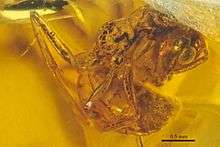

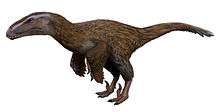


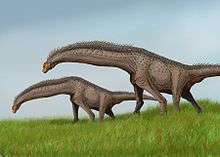
-PaleozoologicalMuseumOfChina-May23-08.jpg)



